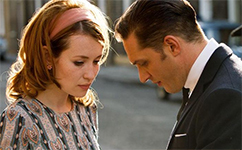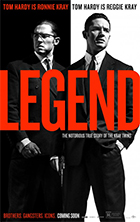Legend (2015)
|  In Brian Helgeland’s Legend, Tom Hardy plays both Ronnie and Reggie Kray, twin brothers from East London who all but ran organized crime in London in the 1960s. As would be expected from Hardy, it’s a bravura dual performance, putting him in that rarified category of actors (including Jeremy Irons in Dead Ringers and Nicolas Cage in Adaptation.) who have conquered the challenge of playing twins in a way that doesn’t feel forced or gimmicky. It helps that the Kray brothers, despite being identical twins, were so fundamentally different: Reggie, the more grounded of the two, always seeking middle ground between the violence of his criminal enterprise and his desire for some kind of normality, and Ronnie, unhinged, voracious, quite literally insane. They are always easy to distinguish visually because Ronnie wears glasses, but Hardy also plays them with a completely different kind of physicality. If Reggie is upright and smooth, Ronnie has a slightly hunched quality, his face pinched and his mouth drawn (it is arguably his most convincing, physically transformative performance since his 2008 breakthrough in Bronson). They rarely appear on screen together, and when they do, it is something of a shock because it is easy to forget that we’re watching the same actor. Hardy plays them like a Janus head—two faces going in different directions, but inextricably and tragically inseparable. In Brian Helgeland’s Legend, Tom Hardy plays both Ronnie and Reggie Kray, twin brothers from East London who all but ran organized crime in London in the 1960s. As would be expected from Hardy, it’s a bravura dual performance, putting him in that rarified category of actors (including Jeremy Irons in Dead Ringers and Nicolas Cage in Adaptation.) who have conquered the challenge of playing twins in a way that doesn’t feel forced or gimmicky. It helps that the Kray brothers, despite being identical twins, were so fundamentally different: Reggie, the more grounded of the two, always seeking middle ground between the violence of his criminal enterprise and his desire for some kind of normality, and Ronnie, unhinged, voracious, quite literally insane. They are always easy to distinguish visually because Ronnie wears glasses, but Hardy also plays them with a completely different kind of physicality. If Reggie is upright and smooth, Ronnie has a slightly hunched quality, his face pinched and his mouth drawn (it is arguably his most convincing, physically transformative performance since his 2008 breakthrough in Bronson). They rarely appear on screen together, and when they do, it is something of a shock because it is easy to forget that we’re watching the same actor. Hardy plays them like a Janus head—two faces going in different directions, but inextricably and tragically inseparable.Helgeland, whose most recent film was the Jackie Robinson biopic 42 (2013), wrote the script based on John Pearson’s 1995 book The Profession of Violence: The Rise and Fall of the Kray Twins, and as the book’s title suggests, the film falls very neatly into the time-honored narrative arc associated with the gangster film since The Public Enemy (1931) and Scarface (1932). He modifies it somewhat by largely eliminating the rise portion of the arc, beginning the film instead in the early 1960s when the Krays were already pretty much running the show in Blighty. They do gain additional power during the first half the film, pushing out competitors and aligning themselves with the American Mafia via Chazz Palminteri’s Angelo Bruno, who likes working with Reggie but is wary of Ronnie, and not just because of his openly professed bisexuality (the scene in which Reggie informs him that he “likes boys” is one of the film’s great moments of tense black humor). Rather, it is Ronnie’s volatility that poses the real risk, and Reggie spends much of the film either reigning in his brother’s violence or trying his best to clean up afterwards. The Krays do much of the work with a fixer named Leslie Payne (David Thewlis), who Reggie trusts and Ronnie does not. However, their differing views on Payne pales in comparison to the rift that emerges between them when Reggie becomes romantically involved with Frances Shea (Emily Browning), a pretty, but fragile young woman who is the sister of one of their associates (she also serves as the film’s mournful narrator). Reggie sees in Frances a path to normality, although he cannot bring himself to shed his criminal ways, something that Frances insists he do if they are to be together. Unlike many women in gangster films who become willing accomplices of their men, if only by constantly looking the other way, Frances consistently pressures Reggie to go straight, something he can’t seem to do even as he resists the label “gangster” (he insists that he and Ronnie are merely club owners). Browning plays Frances as a woman of great resolve who is nevertheless constantly in danger of falling apart, something that all the pills in the world are incapable of stopping. Thus, she is essentially the film’s moral compass, reminding us that however smooth and suave the Krays may look, they are vicious men of no remorse (interestingly, the Freudian subtext of mother attachment that dominated Peter Medak’s 1990 film The Krays, which starred real-life brothers Gary and Martin Kemp of the New Wave band Spandau Ballet, is almost entirely absent here outside one scene when Ronnie and Reggie’s mother pampers Ronnie after he had cold-bloodedly murdered someone). As another riff on a set of familiar narrative beats, Legend works well enough, although for anyone who has seen a number of gangster films, particularly those directed or inspired by Martin Scorsese, it might feel a bit too familiar (the title of the film also feels overblown because, even though it is clear that the Krays wreaked havoc and spread fear throughout the East End of London, their criminality feels relatively contained and hardly worthy of “legendary” status). Helgeland manages to include all of the Krays’s most notorious exploits without making the film feel overstuffed, which includes multiple jail stints for both men, their conflicts with several rivals, and a near-explosive scandal involving Lord Boothby, a member of British parliament who struck up a friendship with the gangsters and began attending Ronnie’s sex parties. Always tracking the Krays is dogged, perhaps obsessive Scotland Yard detective Nipper Read (Christopher Eccleston), although the Krays generally manage to stay one step ahead of him until Ronnie becomes too brash in his violence, thus setting off a chain of events that ultimately brings him and his brother down. The final moments of the film are genuinely startling as the two brothers essentially merge, and all the sanity we were clinging to dissipates in a fit of violent rage. It is testament to Helgeland’s general restraint throughout the film that its moments of violence have real impact (we aren’t inured to blood by the last reel), and even if it doesn’t ever rise to legendary status itself, Legend is a fitting portrait of the twin gangsters who, while they had their moment in the ’60s, have already begun to fade from view. Copyright ©2015 James Kendrick Thoughts? E-mail James Kendrick All images copyright © Universal Pictures |
Overall Rating: 

 (3)
(3)


